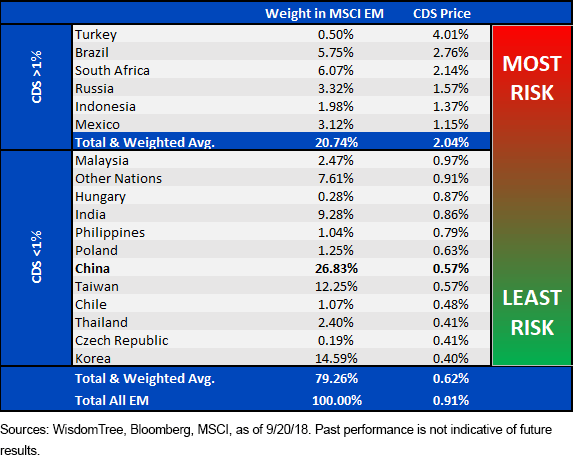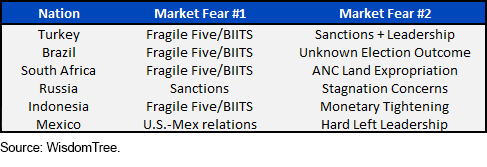China: The Emerging Markets (Relative) Haven


The S&P China 500 is down 25% since January 26,1 an ugly and quick plunge that fits the common definition of a bear market. Who in their right mind would use “haven” in the same sentence as “China”?
We will, in context.
Compared to cash in a Zurich vault, no, China is not even close to a haven. But is its equity market a haven compared to that of other nations in the emerging world? We hypothesize yes.
The Fragile Five
The market’s current focus—and maybe the focus next year too—is the so-called “Fragile Five” current account deficit nations: Brazil, Indonesia, India, Turkey and South Africa (the “BIITS”).
In “Getting More Defensive in European Portfolios,” we discussed the effect the Turkish debt crisis may have on neighbors, particularly Europe and its banks. Along with Argentina, Turkey is at the top of the crisis malaise leaderboard, courtesy of a burgeoning hard currency debt load, runaway inflation that far exceeds the state’s 17.9% official number and its deep 6.5% current account deficit gauge of two-way capital flows.2
Is that latter metric—the current account—the primary reason the BIITS currencies have come under pressure? Yes, but there are other factors. For example, South Africa’s expropriation of Afrikaner farms places serious question marks on general property rights in a nation that has a history of state-mandated equity dilution.
Which takes us back to China. Five-year credit default swaps, which gauge the cost of insuring against default by Beijing, pale in comparison to those of other emerging sovereigns, and for good reason. While it costs $401,000 per year to insure $10 million of hard currency 5-year Turkish debt, the price for covering Chinese exposure is just $57,000.
Beijing is no Bern or Oslo, but then again it also isn't Brasilia, which faces a major question mark on its upcoming election. No one knows what economic policies the leading candidates may try to implement. From a risk-of-not-getting-paid-on-your-bonds perspective, Beijing is one of those in-between countries— not the most stable, but nevertheless a veritable haven in the context of some of these other governments.
Figure 1: 5-Year Sovereign Credit Default Swaps (CDS) Prices, Emerging Nations

Figure 2 summarizes some of the current risk drivers befalling the six nations with CDS north of 1%.
Figure 2: Market Concerns, Six Focal Nations

The Other Three
Beyond the already mentioned trouble spots, embattled Russia is hit by sanctions for both the Crimean and Ukrainian invasions and the Salisbury poisoning, which entailed a brazen use of a military-grade nerve agent on British soil. This is to say nothing of Russia’s support for the al-Assad regime in Syria, which, by the way, is opposite the U.S.-Saudi alliance.
As for Indonesia, it had to tighten monetary policy this summer in what has thus far been a failed attempt to stave off the rupiah’s waterfall decline to levels last seen in the 1990s Asian contagion.
Mexico has long suffered from trade war headlines, but now the risk is morphing into the very real concern that President-elect Andrés Manuel López Obrador (“AMLO”) will choose the Venezuelan or Cuban route instead of, say, the Chilean one.
China: The Relative Haven?
China is, of course, not without warts. Coastal housing prices are in runaway territory, with cities like Shanghai witnessing home price-to-income levels that make New York City blush. Then there is the Trump and Xi chest thumping, with North Korea smiling, stage left. However, we question how, even if all $466 billion of Chinese exports to the United States disappeared, it would warrant sending the equities of a $12.2 trillion economy3 into bear territory.
At this time next year, we suspect the market will still question South African property law and Turkey’s debt serviceability. But China, a current account surplus nation, may be in a different place, a place where WisdomTree no longer feels alone in the darkness, wondering why so few investors even know about its massive tax code overhaul.
Xie Yu of the South China Morning Post, Hong Kong’s paper of record, said this on August 27, in direct parallel with our “The Gipper Comes to China” research note:
Ernst & Young estimates that changes in exemptions and tax brackets—including raising the monthly tax exemption allowance by 40 per cent to [CNY5,000] per month—would trim the monthly burden of a taxpayer with a gross monthly wage of [CNY60,000] by 16 per cent, to [CNY11,006].
Individuals at lower income levels will fare better. Someone with a [CNY10,000] monthly salary will see their tax bill slashed by 71 per cent to [CNY115].
In Dollar Terms
Look at the last sentence of the passage and convert CNY to USD. Someone who makes $17,532 per year and was paying $695 in annual taxes would then owe just $201, a cut of $494. Tell us: What would happen to U.S. retail sales or the S&P 500 if the U.S. had the courage to cut taxes for Walmart-style incomes by nearly $500 per head?
In other words, while no one knows who will win the Brazilian presidency, and while South African headlines may continue to be dominated by property-seized Afrikaners, it is quite possible that the images from China in 2019 are those of packed shopping malls.
China is the haven in emerging markets, with an unappreciated upside catalyst poised to click when the market gets off the trade war story and gets on tax reform.
We have two China pure plays: the WisdomTree China ex-State-Owned Enterprises Fund (CXSE) and the WisdomTree ICBCCS S&P China 500 Fund (WCHN).
1Source: Bloomberg, through 9/20/18.
2Source: Bloomberg, as of Q2 2018.
3Source: Exports by Customs General Administration PRC, as of 8/31/18. GDP by the World Bank, 2017.
Important Risks Related to this Article
Neither WisdomTree Investments, Inc., nor its affiliates, nor Foreside Fund Services, LLC, or its affiliates provide tax advice. All references to tax matters or information provided on this site are for illustrative purposes only and should not be considered tax advice and cannot be used for the purpose of avoiding tax penalties. Investors seeking tax advice should consult an independent tax advisor.
There are risks associated with investing, including possible loss of principal. Foreign investing involves special risks, such as risk of loss from currency fluctuation or political or economic uncertainty. These Fund focuses its investments in China, including A-shares, which include risk of the RQFII regime and Stock Connect program, thereby increasing the impact of events and developments associated with the region which can adversely affect performance. Investments in emerging or offshore markets are generally less liquid and less efficient than investments in developed markets and are subject to additional risks, such as risks of adverse governmental regulation and intervention or political developments. The Funds’ exposure to certain sectors may increases its vulnerability to any single economic or regulatory development related to such sector. As these Funds can have a high concentration in some issuers, the Fund can be adversely impacted by changes affecting those issuers. One of these Funds will be required to include cash as part of its redemption proceeds which introduces additional risks, particularly due to the potential volatility in the Chinese market and market closures. The Fund invests in the securities included in, or representative of, its Index regardless of their investment merit and the Fund does not attempt to outperform its Index or take defensive positions in declining markets. Due to the investment strategy of these Funds they may make higher capital gain distributions than other ETFs. Please read each Funds’ prospectus for specific details regarding the Funds’ risk profile.


